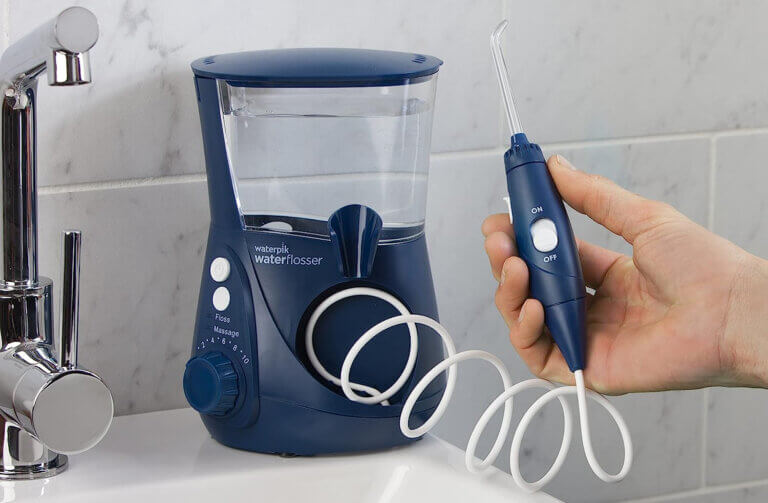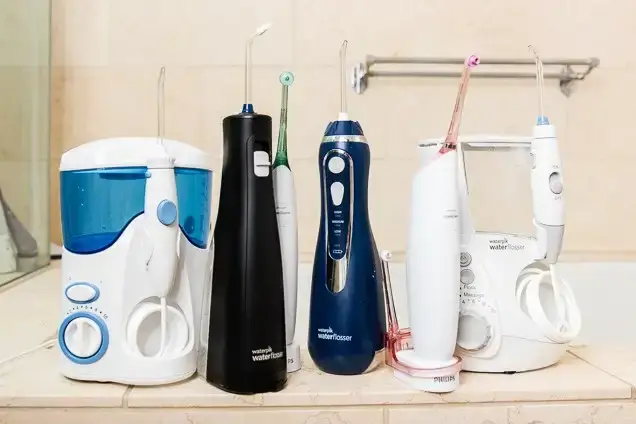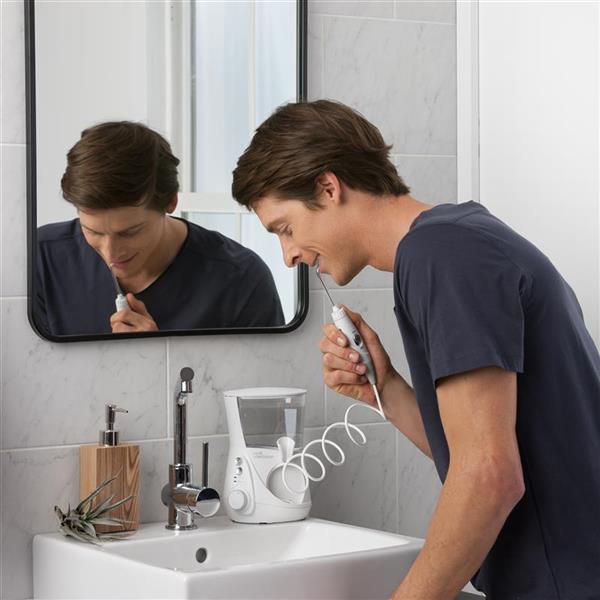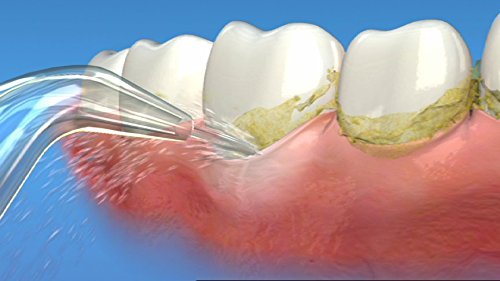Maximizing The Benefits Of A Water Flosser

What Is a Water Flosser?
Water flossers, also known as oral irrigators, have become a popular tool for achieving optimal oral hygiene. These devices use a focused stream of water to remove plaque and food particles between teeth and along the gumline, reducing the risk of gum disease and cavities. For many, they provide a more comfortable and efficient alternative to traditional flossing.
In this comprehensive guide, we’ll explore how to make the most of your water flosser, from choosing the right model to using it effectively and maintaining it for long-term use:
- Choose The Right Water Flosser For Your Needs
- How To Use A Water Flosser
- Tips For Effective Use Of Your Water Flosser
- Maintenance And Care Of Your Water Flosser
- Frequently Asked Questions About Water Flossers
If you have any further questions about Water Flossers or other oral hygiene tips offered at Atlas Dental, please contact us.
Choose The Right Water Flosser For Your Needs
Selecting the right water flosser ensures you’ll stick to your daily dental care routine. Consider these factors:
- Brand and Reliability: Opt for reputable brands like Waterpik, known for their effectiveness and durability. Check reviews for performance feedback.
- Features and Nozzle Options: Some models come with specialized nozzles for braces, periodontal pockets, or even nasal irrigation.
- Portability and Size: Compact models are ideal for travelers or those with limited counter space, while countertop models offer higher water capacity.
- Power Source: Decide between battery-operated and plug-in options based on convenience and your lifestyle.
- Budget: Prices range widely, so choose a model with features that fit your needs without exceeding your budget.
By considering these factors, you can choose a water flosser that is right for your needs, budget, and lifestyle. For more information about water flossers and other oral hygiene tips, contact us at Atlas Dental.

How To Use A Water Flosser
Before using your water flosser, it’s important to be familiar with the device and properly prepare it for use. Here’s what you should do:
- Fill the Tank: Use lukewarm water to prevent discomfort or device damage.
- Add Mouthwash (Optional): For an extra antibacterial boost, mix in a dentist-recommended mouthwash. Follow manufacturer guidelines.
- Attach the Appropriate Nozzle: Choose the nozzle suited to your needs, such as orthodontic or gum massage tips.
- Position Yourself: Lean over the sink to prevent splashing, and hold the flosser at a 90-degree angle to your gumline.
- Start on a Low Setting: Begin with a gentle pressure and increase gradually as you become comfortable.
- Follow a Systematic Path: Start at the back of your mouth and work your way forward, cleaning between each tooth and along the gumline.
- Rinse Thoroughly: Once finished, spit out the water and rinse your mouth.
Remember to be gentle and take your time to ensure that you are thoroughly cleaning all areas of your mouth.For more information about water flossers and other oral hygiene tips, contact us at Atlas Dental.

Tips For Effective Use Of Your Water Flosser
To get the most out of your water flosser and ensure that you are effectively cleaning your teeth and gums, here are a few tips to keep in mind:
- Be Consistent: Use your water flosser daily, ideally before bedtime, for the best results.
- Pair with Regular Brushing and Flossing: While water flossers are effective, they don’t replace brushing and traditional flossing.
- Target Problem Areas: Focus on hard-to-reach spots, especially if you have orthodontic appliances or bridges.
- Set a Timer: Aim for at least 2 minutes to ensure thorough cleaning.
By following these tips, you can effectively use your water flosser to clean your teeth and gums and improve your dental hygiene.For more information about water flossers and other oral hygiene tips, contact us at Atlas Dental.

Maintenance And Care Of Your Water Flosser
To keep your water flosser in top condition:
- Clean the Water Tank: Empty and rinse the tank after each use to prevent bacterial growth.
- Wash the Nozzle: Rinse thoroughly and let it air-dry.
- Descale Regularly: Use a vinegar-water solution monthly to remove mineral buildup.
- Replace Nozzles as Needed: Follow the manufacturer’s recommendations for nozzle replacement, typically every 3–6 months.
Proper maintenance and care of your water flosser can help extend its lifespan and ensure that it continues to effectively clean your teeth and gums.For more information about water flossers and other oral hygiene tips, contact us at Atlas Dental.
Frequently Asked Questions About Water Flossers
- Can I use a water flosser if I have braces or implants?
Yes! Water flossers are highly recommended for braces and implants as they effectively clean around brackets, wires, and prosthetic teeth without causing damage.
- Are water flossers safe for children?
Absolutely. Many water flossers come with kid-friendly settings. Always supervise younger children to ensure safe use.
- Do I still need to floss if I use a water flosser?
Yes, traditional flossing complements a water flosser by removing plaque and debris that water alone might miss.
- How often should I use a water flosser?
Use your water flosser daily as part of your oral hygiene routine, ideally before bedtime.
Using a water flosser is a fantastic way to maintain excellent oral hygiene, especially for those with unique dental needs. For more tips on oral hygiene or recommendations tailored to your dental needs, contact us at Atlas Dental. Our team is here to help!

